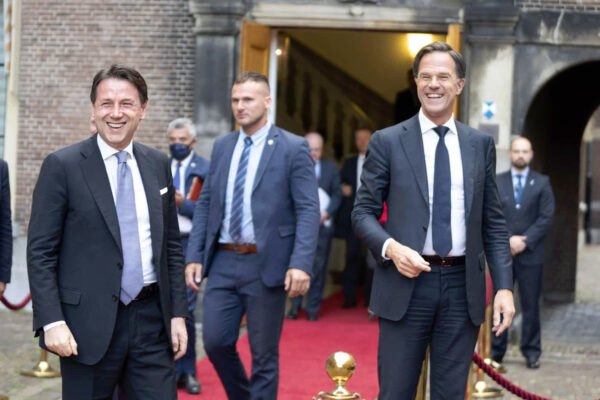
Dutch prime minister Mark Rutte has taken a hard line in Brussels on the conditions of coronavirus aid to Southern Europe, but at home his government has abandoned austerity without controversy.
During the last economic crisis, Rutte, who has led the liberal People’s Party for Freedom and Democracy since 2006, raised taxes and cut public spending to keep the Netherlands’ budget deficit under the EU’s 3-percent ceiling.
Now, when the economic contraction caused by COVID-19 is even more severe, he is borrowing €56 billion, or 7.2 percent of GDP. Debt as a share of economic output is projected to rise from 49 to 61 percent.
Statism is back in a country that is (or used to be) considered a champion of liberalization and free trade.
Rutte’s competitors spy an opportunity.
Attack liberalism
“We’ve tried to push people into systems. We’ve placed efficiency on a pedestal. We’ve forgotten to trust each other,” argues Sigrid Kaag, trade minister and the leader of the centrist liberal Democrats.
“It is time to end the liberal celebration,” argues Gert-Jan Segers, who leads the smallest of the four parties in Rutte’s government, the Christian Union.
Tom-Jan Meeus writes in the NRC newspaper that these attacks on (economic) liberalism are really attacks on Rutte — from his nominal partners.
Other party leaders are more direct.
Labor’s Lodewijk Asscher, who served as social affairs minister in Rutte’s previous government, argues, “Rutte’s time is over.”
Pieter Heerma, whose Christian Democratic Appeal has governed with Rutte’s liberals since 2017, argues, “The Rutte of recent years is unsuitable to the future of the country.”
Broadsides
Meeus wonders how effective these attacks these will be.
Broadsides against liberalism are unlikely to resonate with voters. But on two concrete issues where many parties feel the Netherlands has liberalized too far — health care and rents — there is not much the government can do short of (re)nationalization.
Hospitals, which operate independently and are typically owned by local governments and pension funds, and elderly-care homes, which are privately owned and run, negotiate their prices with insurance companies and their salaries with trade unions. The national government pays half the cost of private insurance and the full cost of elderly and long-term care. But it doesn’t set prices or salaries. To do so would requiring reversing the liberalizations of the early 2000s, which were backed by all the major parties in order to improve the quality of health care and eliminate waiting lists. (Which they did.)
Rents in public housing are capped, but the associations which manage them are independent and the state can’t dictate maximum prices in the private sector. Like the liberalization of health care, all the major political parties backed the privatization of housing associations in the 1990s so they would no longer need government subsidies. (And many don’t.)
Risks
The Christian Democrats, liberal Democrats and Labor can try to blame Rutte’s liberals for low salaries in health care and high rents, but the only parties free of blame and responsibility are the Socialists on the far left and Thierry Baudet’s Forum for Democracy and Geert Wilders’ Freedom Party on the far right.
Repudiating (successful) reforms that were carried out with cross-party support would feed into their narrative that the Netherlands is governed by an unaccountable “party cartel” that muddles through no matter how Dutch people vote.
There is some truth in that, but it’s the reason the Netherlands is such a happy little country: because reforms require buy-in from across the political spectrum, as well as relevant societal actors, such as employers, environmental organizations and trade unions, they are often based on research and lessons learned in other countries, rather than ideology, and seldom sidetracked. Citizens, businesses and local governments can plan for the long term.
Calling entire systems into question and then fiddling around the edges — which is always the most likely outcome in the polder — risks disappointing voters.
There is a reason Rutte has been prime minister for a decade. He doesn’t overpromise. He invariably presents his policies as common-sense solutions to problems that are not of his making. He famously struggled to articulate his vision, quoting Helmut Schmidt when asked: “Those with visions should see a doctor.” Voters rewarded Rutte with his party’s biggest election victory in history.
Trust in the government is up since the beginning of the pandemic. 62 percent of voters approve of Rutte’s job performance. 58 percent call him the perfect prime minister.
